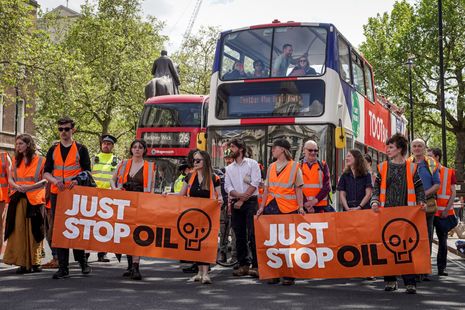Cambridge student jailed for planned M25 disruption
 Gethin, 22, said in April that Cambridge University gives legitimacy to companies that "kill people around the world"Alisdaire Hickson / Flickr https://creativecommons.org/licenses/by-sa/2.0/
Gethin, 22, said in April that Cambridge University gives legitimacy to companies that "kill people around the world"Alisdaire Hickson / Flickr https://creativecommons.org/licenses/by-sa/2.0/
A Cambridge student and Just Stop Oil (JSO) activist has been given a four-year prison sentence for conspiring to intentionally cause a public nuisance, alongside four other environmental campaigners. The five activists conspired to disrupt traffic by having protesters climb onto gantries over the motorway for four consecutive days in November 2022. The group, dubbed the 'Whole Truth Five' by JSO, comprises Cressida Gethin, a music student at Cambridge, Roger Hallam, co-founder of JSO and Extinction Rebellion, Daniel Shaw, Louise Lancaster, and Lucia Whittaker De Abreu.
Roger Hallam, who debated at the Cambridge Union last month, received a five-year prison sentence, while the other four defendants were each sentenced to four years. The sentences are the longest[1] handed out in the UK for non-violent protest since the last government introduced new powers to tackle disruptive protest. Cressida Gethin told the judge: "It was always my intention to limit the harm caused by the disruption." But, she said, the action would not have happened if "those in power had been taking their responsibilities seriously".
In April, Gethin told[2] Varsity that Cambridge University gives legitimacy to companies that "kill people around the world" through its fossil fuel partnerships. A recording of a Zoom call held by the group in November 2022, during which discussions were held regarding the planned protests, was passed to the police by a journalist at the Sun newspaper. According to prosecutor Ms.
Ledward's statements in court, it is understood they aimed to recruit additional participants for the protests during this call. There was "extensive organisation and planning" for the protests and each defendant had a "significant role" in these plans, Ms Ledward said. Judge Christopher Hehir said the Zoom call showed "how intricately planned the disruption was and the sophistication involved".
He claimed that it was "compelling evidence" of the existence of a "conspiracy" to cause disruption. Judge Hehir also said: "The plain fact is that each of you some time ago has crossed the line from concerned campaigner to fanatic. You have appointed yourselves as sole arbiters of what should be done about climate change."
Addressing Hallam, the judge said: "You are the theoretician, the 'ideas' man. In my judgment you sit at the very highest level of the conspiracy." Hehir instructed[3] the jury not to consider evidence concerning climate breakdown, which the defendants sought to highlight as their primary motivation and a reasonable excuse for their actions.
Michel Forst, a former UN Special Rapporteur who had observed part of the trial, condemned[4] the stringent protest laws implemented under the Conservative government. He remarked: "Facing multiple years in prison for participating in a Zoom call - this is unprecedented and incredibly disproportionate." Prosecutors claimed that the M25 protests which resulted from the Zoom call, involving 45 individuals climbing gantries, caused[5] an economic impact of at least GBP765,000, with the Metropolitan Police incurring costs exceeding GBP1.1 million.
The protests reportedly caused over 50,000 hours of vehicle delay, impacted more than 700,000 vehicles, and rendered sections of the M25 motorway "compromised" for over 120 hours. The demonstrations resulted in closures across parts of Kent, Surrey, Essex, and Hertfordshire. Will McCallum, co-executive director of environmental campaign network Greenpeace UK, said[6] on X he was "appalled at [the] draconian prison sentences" handed out to the activists.
"Peaceful protest is vital for healthy democracy. Will the new @attorneygeneral[7] immediately turn attention to stopping these authoritarian responses to protest?" he asked. Support Varsity
Varsity is the independent newspaper for the University of Cambridge, established in its current form in 1947. In order to maintain our editorial independence, our print newspaper and news website receives no funding from the University of Cambridge or its constituent Colleges. We are therefore almost entirely reliant on advertising for funding and we expect to have a tough few months and years ahead.
In spite of this situation, we are going to look at inventive ways to look at serving our readership with digital content and of course in print too!
Therefore we are asking our readers, if they wish, to make a donation from as little as GBP1, to help with our running costs.
Many thanks, we hope you can help!